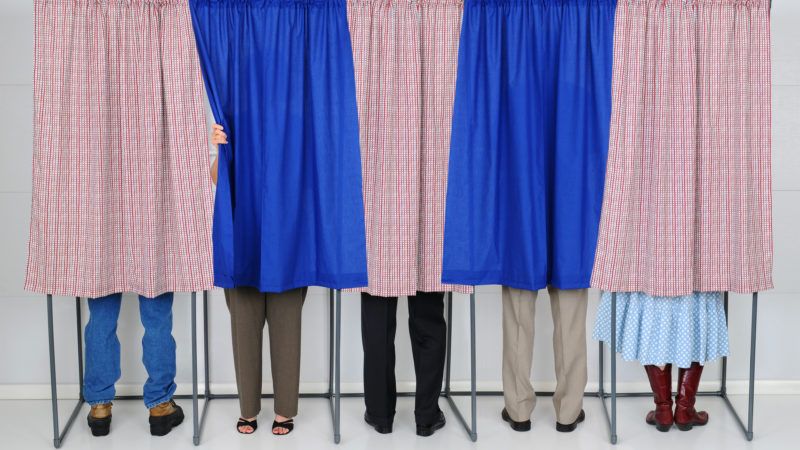The Election Could Be Chaotic. Why Is Trump Trying To Make It Worse?
America's general election is facing both logistical and political hurdles, creating a feedback loop that threatens to derail the legitimacy of the results.

Held last weekend, the Puerto Rican gubernatorial primary may have raised the bar for the most turbulent election in a year already marked by plenty of baffling balloting. It's also a likely preview of what will happen across the rest of America in November.
Some Puerto Rico voters stood in line for hours to cast their ballots, risking exposure to the coronavirus and extreme tropical heat, The New York Times reported. The long lines were caused, in part, because ballots were not delivered on time to some polling places. Eventually, the territory's election commission stepped in and postponed the election until next weekend in areas where insufficient ballots were available—though the Puerto Rican Supreme Court will ultimately decide whether votes cast last weekend in those places will count or if they must be tossed, according to the Times.
It is a mess. And not an isolated one. Georgia's June 9 primary election broke turnout records despite the pandemic but was marred by long lines and widespread voter confusion. Georgia poll workers were calling in sick and some polling places had to be relocated at the last minute to accommodate social distancing requirements. New York State is still not finished counting the mail-in ballots it received for its primary election, and two races remain undecided. The election was held on June 23.
Perhaps it is a blessing that this slow-motion election train wreck has so far had relatively low stakes—ultimately, there just aren't that many people who care about the outcome of the Democratic primary for New York's 12th congressional district. Former vice president Joe Biden, meanwhile, had the higher-stakes Democratic presidential primary race well in hand before the COVID-19 pandemic struck.
But as November's general election approaches, the above factors and many others could combine to make the almost inevitable post-election chaos seem even worse. Millions of Americans who haven't been paying close attention to messes that unfolded in New York and Puerto Rico this summer might wake up on November 4 expecting to know who won the presidential election. They are unlikely to have an answer, as it will take days or perhaps weeks to count all mail-in ballots and certify the results.
America's general election is facing both logistical and political hurdles. The two challenges reflect and enhance one another, creating a feedback loop that threatens to undermine the legitimacy of the results.
Both aspects have been on full display this week.
Puerto Rico's ballot-delivery disaster is close to a worst-case scenario for any state or territory—imagine if something similar happens in a swing state on November 3. States could avoid some of the in-person voting issues that the pandemic has created by expanding mail-in voting access, but that creates further logistical problems (see what happened in New York this summer) and has triggered political pushback. This week, for example, the Republican National Committee asked the U.S. Supreme Court to stop a decision by Rhode Island election officials that will allow more voters to use absentee ballots.
Previously, voting by absentee ballot in Rhode Island was ridiculously difficult. Voters had to have two witnesses sign their ballot and get the ballot notarized. State officials dropped those requirements for this year to allow more people to vote by mail, but it remains to be seen whether federal courts will allow it.
In other situations, the Trump administration has sought to withhold federal funds from states that try to expand absentee voting, a maneuver that raises constitutional issues regarding the separation of powers.
Those political hurdles create more logistical problems in part because a sudden increase in voting by mail requires an effective and efficient postal service. Some Democrats see Trump's recent overhaul of the U.S. Postal Service's leadership as a nefarious attempt to interfere with mail-in balloting. Trump could easily deflect that attack by pointing out that the post office is an inefficient, bureaucratic mess that's been crying out for reform—but he's chosen instead to all but confirm the theory that, yes, it's about the election.
Trump saying clearly on Fox why he won't fund USPS. "Now they need that money in order to make the post office work so it can take all of these millions and millions of ballots…But if they don't get those two items that means you can't have universal mail-in voting…"
— Abby D. Phillip (@abbydphillip) August 13, 2020
As I wrote in a feature about mail-in voting last week, Republicans are wrong to worry about mail-in voting fraud or to fret that more absentee ballots will boost Democratic candidates this year. In fact, mail-in voting is generally more secure than in-person voting because there is a paper trail for the entire process—the biggest downside to mail-in balloting isn't fraud but the time that it takes to check and tally every vote.
Somewhat ironically, Trump's campaign to delegitimize mail-in voting might end up hurting Republicans more than Democrats. One analysis of the 2016 election found that the people most likely to vote by mail were white voters over the age of 65—a key Trump demographic, and a group most likely to be frightened away from the polls by the threat of the coronavirus.
Whether by suing over absentee voting rules, meddling with the postal service, or disseminating spectral fears of voter fraud, the Republican goal seems to be to create confusion and distrust ahead of the 2020 general election—either as a tactic to help Trump's chances of winning or to have an excuse if he loses.
It is a dangerous game. Elections only work if they are widely viewed as legitimate. The coronavirus is creating new and unexpected hurdles for election officials trying to meet that standard. The president (and his party) should stop making things worse.


Show Comments (140)